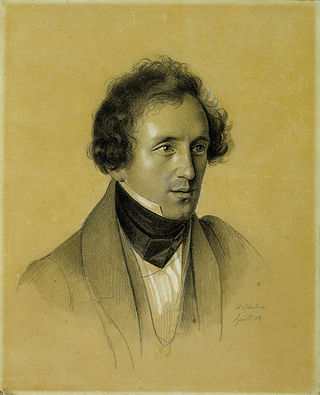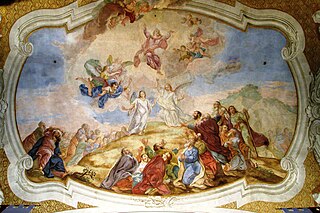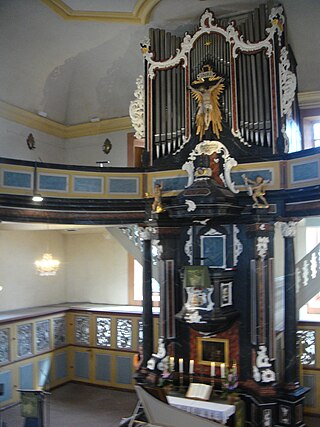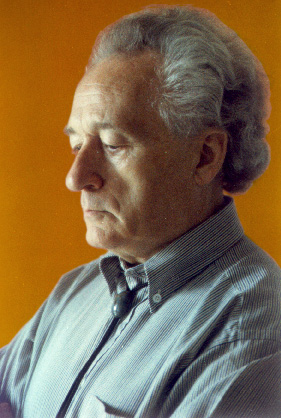Related Research Articles

Kindertotenlieder is a song cycle (1904) for voice and orchestra by Gustav Mahler. The words of the songs are poems by Friedrich Rückert.

St. Paul, Op. 36, is an oratorio by Felix Mendelssohn. The composer oversaw versions and performances in both German and English within months of completing the music in early 1836.

Lobet Gott in seinen Reichen, BWV 11, known as the Ascension Oratorio, is an oratorio by Johann Sebastian Bach, marked by him as Oratorium In Festo Ascensionis Xsti, probably composed in 1735 for the service for Ascension and first performed on 19 May 1735.
Johannes Wolfgang Zender was a German conductor and composer. He was the chief conductor of several opera houses, and his compositions, many of them vocal music, have been performed at international festivals.

The Children of Golzow is a documentary by the German filmmaker Winfried Junge that was started in 1961 and lasted until 2007, when the series concluded. The film is a prolonged observation of the lives of several people in the Brandenburg town of Golzow.

Between 1716 and 1767, Georg Philipp Telemann wrote a series of Passions, musical compositions reflecting on Christ's Passion – the physical, spiritual and mental suffering of Jesus from the hours prior to his trial through to his crucifixion. The works were written for performance in German churches in the days before Easter. A prolific composer, Telemann wrote over 40 Passions for the churches of Hamburg alone, of which 22 have survived according to the present state of research. He also wrote several Passion oratorios. Unlike the Passions intended for liturgical performance, they were not closely set to the literal text of the Gospels.

The Rheingau Musik Festival (RMF) is an international summer music festival in Germany, founded in 1987. It is mostly for classical music, but includes other genres. Concerts take place at culturally important locations, such as Eberbach Abbey and Schloss Johannisberg, in the wine-growing Rheingau region between Wiesbaden and Lorch.

Georg Christoph Biller was a German choral conductor. He conducted the Thomanerchor as the sixteenth Thomaskantor since Johann Sebastian Bach from 1992 to 2015. He was also a baritone, an academic teacher, and a composer. Active as Thomaskantor after the German reunification, Biller returned the Thomanerchor to its original focus on church music. He was instrumental in the new buildings for the choir's boarding school, the Forum Thomanum, and in the celebration of its 800th anniversary in 2012.
Hans-Joachim Rotzsch was a German choral conductor, conducting the Thomanerchor from 1972 until 1991 as the fifteenth Thomaskantor since Johann Sebastian Bach. He was also a tenor and an academic teacher.

Max Reger's 1915 Requiem, Op. 144b, is a late Romantic setting of Friedrich Hebbel's poem "Requiem" for alto or baritone solo, chorus and orchestra. It is Reger's last completed work for chorus and orchestra, dedicated in the autograph as Dem Andenken der im Kriege 1914/15 gefallenen deutschen Helden.
Wolfgang Schäfer is a German choral conductor and academic. He founded the Freiburger Vokalensemble, the BosArt Trio, and the Frankfurter Kammerchor.

Marktkirche is the main Protestant church in Wiesbaden, the state capital of Hesse, Germany. The neo-Gothic church on the central Schlossplatz was designed by Carl Boos and built between 1853 and 1862. At the time it was the largest brick building of the Duchy of Nassau. It is also called Nassauer Landesdom.

Schiersteiner Kantorei is a German concert choir, founded in 1962 at the Christophoruskirche in Wiesbaden-Schierstein. The choir performs regularly in the Marktkirche, Wiesbaden, and in Eberbach Abbey. It is known internationally through its tours and recordings. The choir was awarded the Culture Prize of the City of Wiesbaden in 1990.

Siegfried Köhler was a German conductor and composer of classical music. He worked as general music director of opera houses such as Hessisches Staatstheater Wiesbaden and the Royal Swedish Opera. Köhler conducted premieres of works by Hans Werner Henze and Volker David Kirchner, among others, and revived rarely performed operas. He also composed music for the stage and taught at universities of music in Cologne and Saarbrücken.

Othmar Mága was a German conductor, who was chief conductor internationally, including the Odense Symphony Orchestra in Denmark and the KBS Symphony Orchestra in Korea. Among his many recordings are several rarely played concertos for instruments such as horn and double bass, including works of the 20th century.
Georg Poplutz is a German tenor, a soloist in Baroque music, opera and oratorio, and a Lied singer. He has been a member of vocal ensembles such as Johann Rosenmüller Ensemble and Cantus Cölln, and has participated in a project to record the complete works of Heinrich Schütz.
Erich Wenk was a German bass-baritone singer in opera and especially in concert. He was a professor of voice at the Musikhochschule Köln.
Klesie Kelly, or Klesie Kelly-Moog, is an American soprano and voice teacher at the Musikhochschule Köln and for international master classes.
Franz Schubert's best-known music for the theatre is his incidental music for Rosamunde. Less successful were his many opera and Singspiel projects. On the other hand, some of his most popular Lieder, like "Gretchen am Spinnrade," were based on texts written for the theatre.
Anne Bierwirth is a German contralto, focused on concerts and recordings of sacred music, appearing internationally. Besides the standard repertoire such as Bach's Christmas Oratorio, she has explored rarely performed Baroque music such as Bach's St Mark Passion and Reinhard Keiser's Passion oratorio Der blutige und sterbende Christus.
References
- 1 2 3 4 "Prof. Berthold Possemeyer / Professor / Gesang". University of Music and Performing Arts, Frankfurt am Main . Retrieved 22 March 2013.
- ↑ "Berthold Possemeyer (Bass)". bach-cantatas.com. 2006. Retrieved 22 March 2013.
- ↑ "Volker David Kirchner / Catalogue of Published Works". Schott. 2000. p. 30. Retrieved 26 March 2013.
- ↑ Zibulski, Axel (21 November 2011). "Dramatik und leise Töne: Mendelssohn-Bartholdys "Elias" in der Marktkirche Wiesbaden" (in German). derwesten.de. Archived from the original on 12 April 2013. Retrieved 26 March 2013.
- ↑ "Berthold Possemeyer: Bariton aus Leidenschaft" (in German). derwesten.de. 30 November 2012. Retrieved 26 March 2013.
- ↑ "Ouverture 2007 / Die fromme Helene / Ein gutbürgerliches Kammer-Musical nach Wilhelm Busch" (PDF) (in German). Rheingau Musik Festival. 2007. p. 14. Archived from the original (PDF) on 2013-07-22. Retrieved 27 March 2013.
- ↑ "Ein Sommernachtstraum" (in German). frankfurter-buerger-stiftung.de. 2011. Retrieved 27 March 2013.
- ↑ Und wenn sie nicht gestorben sind ... is an allusion to a typical ending of German fairy tales Und wenn sie nicht gestorben sind, so leben sie noch heute (literally: "And if they have not died, they are still alive today"), the equivalent of the English ending "And they all lived happily ever after".
- 1 2 ""Und wenn sie nicht gestorben sind ..." Alle Märchen der Brüder Grimm in einem Kammermusical" (in German). frankfurter-buerger-stiftung.de. Archived from the original on 2016-03-02. Retrieved 27 March 2013.
- ↑ "Gebrüder Grimm unterstützen die africa action / Das Holzhausen Quartett spendet die Eintrittsgelder" (in German). Freundeskreis Wiesbaden der africa action / Deutschland. Archived from the original on 2 May 2012. Retrieved 27 March 2013.
- ↑ Cookson, Michael (2009). "Felix Mendelssohn-Bartholdy (1809-1847) / Complete Sacred Choral Music". musicweb-international.com. Retrieved 28 March 2013.
- ↑ Hugill, Robert (2003). "Georg Philipp Telemann (1681 - 1767) / Passions Oratorium - Das selige Erwägen des bittern Leiden und Sterbens Jesu Christi". musicweb-international.com. Retrieved 28 March 2013.